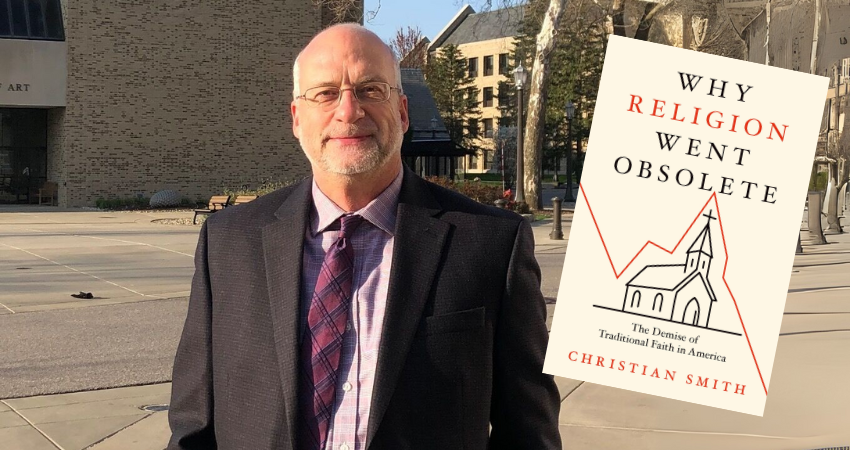Review: Why Religion Went Obsolete: The Demise of Traditional Faith in America, Christian Smith, Oxford University Press
In recent decades there have been many books arguing not only that religious beliefs are misplaced, but that religion is not good for culture and should be made obsolete. This is not one of those books. It is a rarer work of sociology that seeks simply to understand why religion has declined in the United States – going on pew numbers and attitudes to religion – or, more correctly, why, as Smith puts it, institutional religion has declined enough to be ‘obsolete’, like the electric typewriter (his example).
For some audiences, this might seem startling – isn’t America hyper-religious, with Christianity especially prominent in both private practice and public debate? In his book, Smith has an extraordinarily fascinating graph that shows how from 1991 – a turning point – the percentage of Americans in their 20s identifying as ‘not religious’ went into a steep incline, from 10% in 1991 to nearly 50% in 2020. ‘Confidence’ in traditional religion has declined across age groups consistently.
‘Obsolete’ for Smith is not about the truth or not of religion’s claims, but about whether the culture as a whole sees it as believable and relevant, and he concludes it is no longer so. Some of this may be simply perception, but that perception, in informing decisions to stay or leave, is as important as fact.
Obviously, religions did not plan their own demise, and neither, he says, is it simply due to atheist commentators winning a propaganda battle, though they did their part. (Most church leavers don’t suddenly describe themselves as atheist. And there is an increase in interest in alternative spiritualities.) Rather, the obsolescence is ‘unplanned’, the result of huge but often slow and hazy shifts in culture.
What has happened? Smith identifies a number of factors:
Over the twentieth century Christianity increasingly focussed on ethics over salvation from hell (sometimes deliberately). Salvation became an outdated notion to most Americans, while people decided they could still be ethical without attending church (or synagogue).
Evangelicalism blossomed in the 70s and 80s, but there was a backlash against its intensity in the mainstream, with many Americans viewing it as crass and insincere, even before scandals overtook the televangelists.
The collapse of the Soviet Union in 1991 was significant, as suddenly there was no common atheistic enemy to unite against, and Americans instead fell to fighting amongst themselves. The ‘culture wars’ and then the 2001 terror attacks provoked a change in attitude, and religion was seen as divisive.
Neoliberalism and postmodernism both intensified the individualism already prevalent in American culture. Individualism inevitably clashed with the communal, conformist attitudes of churchgoers.
Millennials rejected the attitudes of the Boomers, embracing pluralism and the notion that spirituality was one’s own private business, and not for institutions to dictate. The sexual revolution and identity politics clashed with traditional religious attitudes to the family. Millennials often lumped organised religion in with the failures of Boomers and previous generations. There has been a wider decline in participation in, and trust in, organisations.
Mass consumerism has further intensified individualism and materialism. The pressures and insecurity of work have meant less time to devote to churches.
Technology has taken people away from traditional religion, and worship in particular, creating alternative online communities and sucking up leisure time that might have been spent on less leisurely activities. Global internet connectivity has undermined the idea that churches are unique holders of truth. Our immediate, distracting digital culture has ruined our patience for contemplation, slow dialogue, traditions.
It could be argued that the ‘obsolete’ conclusion is overstated – after-all, a minority of Americans still attending church regularly doesn’t constitute a wipe-out. And Smith is focussing on quantity over quality – there are less people in the churches who think they should be there simply because of societal expectations. Rather, people attend because of personal belief. But in what Smith calls ‘deep culture’, he provides evidence that Christianity, or institutional religion, no longer neatly underpins American worldviews, even if some shrill conservative voices give that impression. When people start to think that the churches provide answers to questions they are not asking, the churches become irrelevant.
In the Australian context, religion has not quite had the same place in the national consciousness. But the ABC has reported recently on something of a revival amongst younger Australians, who are looking for meaning and community amongst a materialist and more insecure society, and who are rebelling against their more irreligious Gen-X parents, though the revival splits between more liberal manifestations of church and conservative religious nationalism. And it’s unclear how long-term this is.*

How churches might address decline, is anyone’s guess, according to Smith. For Australia, while there are differences, there are lessons to be learnt from the sobering American experience. Churches haven’t understood the depth of the problem, Smith writes, and therefore ‘outreach’ programs are often unsuccessful, causing bewilderment and guilt. A reckoning will require an honest reflection on the realities of a shifting culture. Migration will likely continue to complicate the nature of belief. It is likely that some churches will become more conservative and sect-like. Alternatively, there may be continuing opportunities to create countercultural, radically welcoming communities, something like the early church.
Resource: ABC listen –Gen Y and Gen Z are finding God
Nick Mattiske blogs on books at coburgreviewofbooks.wordpress.com and is the illustrator of Thoughts That Feel So Big.






4 thoughts on “America’s Religious Recession”
Religion is dying indeed. The next australian census in 2026 is expected to reveal the majority of us are non-religious. The UK already is. America was a bit slower to recognise the supernatural as an evil blight that should have stayed in the dark ages but it is slowly getting there. I’ll share this to the Australian Atheists Association forum. http://www.australianatheists.org
Hi Wayne, Smith’s book is interesting because his work goes beyond simple polarisations, and one of his findings is that while (particularly younger) Americans are rejecting institutional religion, they are not doing so by necessarily embracing atheism. Rather, they are less tolerant of dogmatism and more tolerant of pluralism, and more open to alternative spiritualities.
That isn’t really news. Yes the ‘no religion’ crowd is still largely spiritual, sickeningly enough. This has been known for some time and many articles have come out about this . While there is a massive move away from organised religion many still think souls exist, some believe in deities, reincarnation, astrology, leprechauns, a flat earth and all sorts of other absurd unproven things which make no sense. Humans are creative and gullible. We’ve always been story tellers and tend to believe the first thing we hear. Looking to other countries like the UK and Australia it can be seen that rationalism takes time. Education is the key.
That isn’t really news. Yes the ‘no religion’ crowd is still largely spiritual, sickeningly enough. This has been known for some time and many articles have come out about this . While there is a massive move away from organised religion many still think souls exist, some believe in deities, reincarnation, astrology, leprechauns, a flat earth and all sorts of other absurd unproven things which make no sense. Humans are creative and gullible. We’ve always been story tellers and tend to believe the first thing we hear. Looking to other countries like the UK and Australia it can be seen that rationalism takes time. Education is the key.